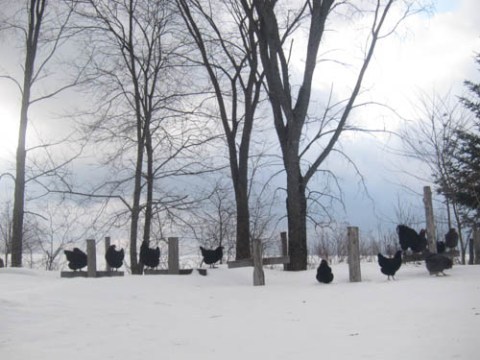Maybe It’s the Process
I was awakened in the night by the sound of snow releasing from the roof. Always startling, that sound: The slide, then the whump of it landing, the small shudder of the house shaking off the load. Startling, but also a tonic, a precursor to spring, an emblem of change. The main roof is clear now; only the shallow-pitched woodshed still wears its top hat, but it is lopsided, curling over the eave further than seems possible, gravitating lower inch-by-inch. Rye worries that his cat will walk beneath it at precisely the wrong time. He whispers in Winslow’s ear to give the woodshed wide berth, and the little ball of fur and purr seems to understand. I watch him choose his path carefully. I don’t know. Maybe it’s just a fluke.
Charles Eisenstein likes to talk about “the space between the stories.” I like Charles. I’m a fan, even if phrases like “the space between the stories” sound to me like the sort of new age vernacular I’m normally inclined to flatten beneath my too-big truck (admittedly, this is probably because I’m still stuck in that space myself). But I think I know what he means. I think he means that space we inhabit when we know the way we’ve been doing things is well and truly fucked, and we have this sense – no, not sense, but actual knowing – that it doesn’t have to be this way, and yet we can’t quite figure out how to get from one story to the other.
I was thinking about the space between stories yesterday, mostly in relation to our educational choices, but also relating to many of our decisions about how we conduct our lives. And it seems to me that whatever struggles we face are almost always the result of living in this space, of choosing to try and cross whatever it is – river, canyon, interstate, mountain range, who friggin’ knows – separating the old story from the new. Or, more likely, the old stories from the new stories; my sense is that there aren’t merely two stories, but an infinite number of overlapping stories, the sum total of which are governed by laws defined both by government and culture. Economy, too. Sometimes I think it’s these laws more than anything that keeps us from moving toward the stories that speak to us.
I hear from a lot of parents who want to rewrite the story of school. They know there’s a more beautiful story (to borrow another of Charles’s terms) for their family, but they have little or even no support. Or it’s worse than that: They have negative support. I think about our own struggles over the years, knowing that in so many ways it would have been so much easier if we’d just sent the boys to school, with its built in social platform and educational process. Instead, we have had to work – and work hard – to create these things for ourselves. It would not be so challenging if the new story were fully formed. It would not be so challenging if we knew exactly what the new story was.
I see it in my work, too, and the difficulty I face in trying to make the work that matters most to me also be the work that puts diesel in the truck I use to crush new age vernacular. Last week, I had lunch with someone who’s in the same boat. She knows where her talents lie; she knows what she feels called to do. It’s not merely a self-inflated opinion of her work, because other people tell her the same. They tell her how much they value this work. Yet she struggles, and I think this is because in the old story, her work has little monetary value. I suspect the same is true of most of what I write.
In My Ishmael, Ismael speaks of the need for an “industrial revolution” of ideas about how to exist. We need a million different people doing a million different things, in the process writing a million different stories. And then we need to share these stories, along with the occasional triumphs, our inevitable failures.
And what do we take from this? The best of the stories will be shared more widely, become more polished. The lesser stories will be discarded. We’ll still probably exist in the space Charles speaks of, maybe forever. Maybe there is no fully realized more beautiful story. I think that’s a real possibility. Probability, even.
But then again, maybe it’s not the outcome that’s so damn important. Maybe it’s the process.

Ben Hewitt's Blog
- Ben Hewitt's profile
- 37 followers





